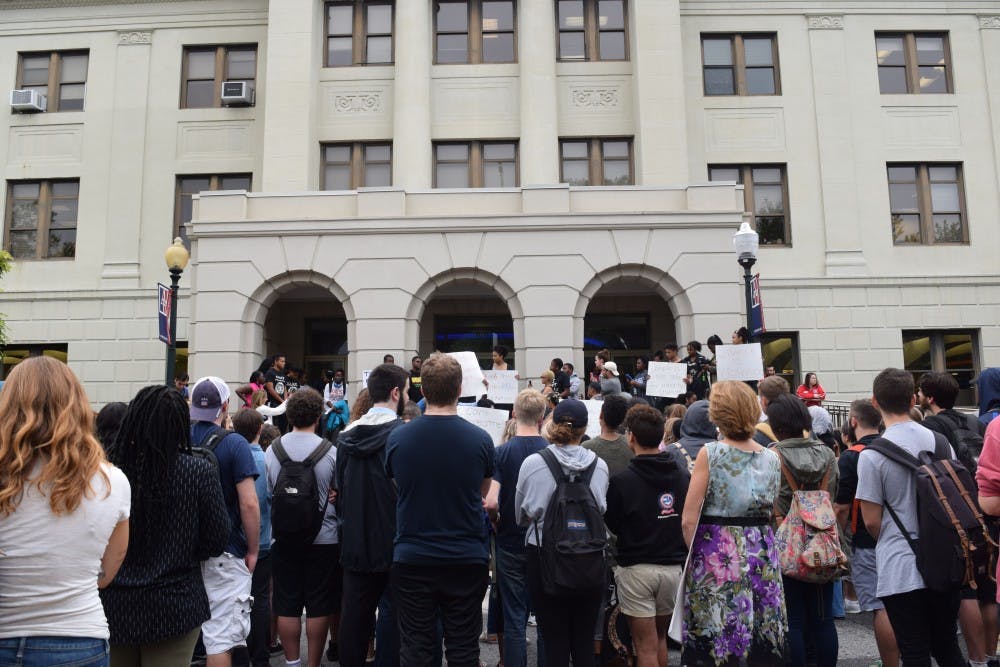Note: In order to respect the safe space and confidentiality of the forum, only interviews conducted with consenting leaders or attendees are included as quotes in this story. Other background information comes only from statements by the leaders of the Roosevelt Institute. No personal stories or individual experiences are included in this piece without explicit permission from the speakers.
In a hot, crowded lounge in Leonard Hall on Tuesday night, nearly fifty students gathered together to discuss racism on campus, issues of inclusivity, and concerns over how University administrators have handled recent racially charged attacks against black female students.
Students sat on the floor comfortably, and took turns speaking and sharing personal stories of discrimination on campus.
Senior Sam Garzillo, the president of the Roosevelt Institute at AU, started the session by welcoming the crowd, many of whom were also Roosevelt members. She discussed the past history of racism on campus and informed attendees of the mental health services available to students on campus. The Roosevelt Institute is a national policy organization, and the AU chapter has dedicated itself to helping “empower students to create and advocate their ideas for change,” according to the group’s Facebook page.
“The Roosevelt Institute is a national think tank, a policy think tank, we have chapters across the country, in almost every state, so I think of us as like a think and do tank,” Garzilla said. “We’ve not only been writing and researching policy, but also doing grassroots work with the policy that we draft.”
At the forum, executive board members of the Roosevelt Institute drew on their personal experiences with discrimination and microaggressions and urged the crowd to think about ways to take the conversation and turn it into action. Garzillo explained that the forum offered a safe space for students to voice their concerns, but she and other leaders of the Roosevelt Institute, including Roosevelt Institute New Chapters Coordinator Mary Marston, stressed that intolerant and hurtful comments would not be accepted.
“We want to learn how to be allies for the black community on campus and other marginalized groups on campus, such as people who don’t identify as cisgender or people on the LGBTQA spectrum,” Marston said before the meeting. “We just want to be more open about it because there are obviously more issues about what people may think is appropriate.”
Sam Trindell, a freshman in the School of International Studies and member of the Roosevelt Institute, said she appreciates the work that Roosevelt does and is inspired by the change that the group has been working to promote.
“I’ve been working with the Roosevelt Institute in general, just as a member, and specifically about this, because I know what the Roosevelt Institute is trying to do is actually change stuff,” Trindell said.
Throughout the session, the students and leaders proposed concrete steps that the administration needs to take in order to work towards a more inclusive and respectful campus culture, including more study abroad options for students in Africa, a greater variety of African American history courses taught by African American professors and a more robust AU Alerts system that notifies students when racist acts occur.
While the Roosevelt executive board offered possible ways to prevent future instances of racism on campus, they emphasized that a large step towards progress involves the administration acknowledging the issue and working with students to find ways to make campus safer.
“I was shocked, not that it happened, but the administration’s response to it,” School of Public Affairs freshman Judy Hasty said. “I was honestly floored and surprised and scared. I’m getting the general idea that the students don’t agree with how the administration does things, and that’s really important for me to know that at least my peers have my back but the administration doesn't. The administration needs to go to counseling and check their own privilege so that they aren’t bias[ed].”
Hasty, also a member of the Roosevelt Institute, said she is disappointed that AU hasn’t worked with students to help prevent issues of racism, particularly given the school’s history with hate crimes, including instances of racists posts on the app Yik Yak and Islamophobic posters that were found on campus last fall. She urged the school to accept responsibility for what happened and inform students of the danger of the current campus climate.
“I personally agree, and all my friends agree, that it would have looked way better for American if they had said ‘these people did it, this is what happened, they are suspended.’ It would have looked so much better for them than the way they handled it this week.”
sscovel@theeagleonline.com





